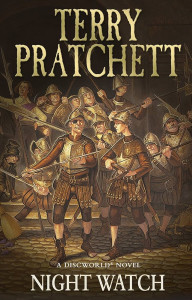 Christine Doiron wrote this review.
Christine Doiron wrote this review.
As a teenager, around the same time as my Monty Python phase, I went through a brief period where I just couldn’t get enough of Terry Pratchett’s Discworld. But, like all phases, I eventually moved beyond it, and — frankly — never looked back. In my memory, Pratchett’s books were funny, usually uproariously so, but not much else. They didn’t touch me, hold my attention beyond the moment, or keep me thinking about them days after I’d turned the last page. They did make me laugh harder than Life of Brian, and that’s certainly nothing to sneeze at, but ultimately I grew up and needed more than just a good laugh out of my reading.
When I was given the opportunity to read this latest offering by Terry Pratchett I thought, “What the hell, why not?” and readied myself to reenter the world of pure silliness I’d long ago left behind. I kept my expectations low as far as substance was concerned, curled up in a comfy chair and waited for the humor to overtake me.
You know, it never really happened. Discworld has changed since last I visited. There are still plenty of laughs to be had here, but they are almost overshadowed by the sheer darkness of this story, and by the remarkably sympathetic, shockingly un-bumbling lead character Sam Vimes. The man is actually deep. He’s sensitive, conflicted, intelligent, and I’ll be damned if he’s not a do-gooder! What’s going on here? The populace of Discworld — at least so far as I remember it from ten years ago — was uniformly shallow, incompetent, and silly. So far as I can recall, there was nary a real hero among them.
At the beginning of Night Watch Sam Vimes is a man without much to complain about. He’s a Duke, he’s wealthy, he has a cushy job, and he’s about to become a father. The Assassins’ Guild has even taken him off their hit list. Unfortunately, life on easy street doesn’t stop him from missing the good old days. Of course, when Vimes accidentally pops himself decades into his past, and takes the psychotic criminal he was chasing at the time along with him, he quickly develops an appreciation for the luxuries of his present (or future depending on how one looks at it) situation.
Sam Vimes is an honest-to-goodness hero. He’s the good guy who always knows the right thing to say or do to make an impossible situation turn out A-okay. He radiates confidence. He’s a man you can trust. He’s the guy you go to when you’re between a rock and a hard place. If you’re a woman, you can’t help but want him. If it weren’t for the careless way he treats his wife, he could almost be the hero of a romance novel. As if it hadn’t already been beaten into us how desirable this man is, there’s even a moment in the story where Vimes actually thinks about the fact that he’s become “strangely attractive to powerful women.”
I’m not complaining. The contrasts between this book and the earliest installments in the series may be stark and surprising. But it’s a pleasant surprise. I don’t remember really caring about the outcome of any of the other Discworld books. I was always just along for the ride, in it for the laughs alone. But not in this new Discworld. This time Pratchett has given us more. There’s a real story here. One that readers can sink their teeth into. Near the end of the book, we’re not giggling. Instead, we’re holding our breaths and hoping everything’s going to work out all right.
Since I’ve missed at least the last decade of Pratchett’s work, I don’t know how he got from pure silliness to this healthy mix of substance and satire, but I’m sure glad he did. This is a Discworld I can really get into. The bottom line is that long-time fans may be disappointed in Night Watch, but I think it’s an enormous improvement over the early books in the series.
(Harper Collins, 2002)
